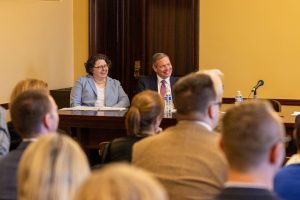Utah lawmakers—and the University of Utah and Brigham Young University—were recognized for a unique brand of collaboration this month at the State Capitol.
Gov. Spencer Cox and the Tolerance Means Dialogues nonprofit foundation hosted a “Dialogue on Tolerance” and recognition of student essay winners on Oct. 30. The university’s Hinckley Institute of Politics and Brigham Young University’s International Center for Law and Religion Studies helped moderate the discussion of how we can live together more respectfully and find common ground.
“We have experts from all across the country who are reaching out to us, who are contacting us, who see something different, something unique here in Utah,” Cox said.
Co-sponsored by Equality Utah, the Federalist Society, and the Fairness for All Initiative, among others, the panel discussion highlighted the discussion and compromise that led H.B. 228, Utah’s ban on conversion therapy, passed last spring.

Elizabeth Clark, associate director of BYU International Center for Law and Religion Studies; and Jason Perry, University of Utah Vice President of Government Relations, listen to Tolerance Means Dialogues event, Oct. 30, 2023.
In particular, Utah’s governor called out Equality Utah Director Troy Williams and Utah Rep. Mike Peterson, a Cache County Republican, for working together on the legislation.
“I am hopeful, but we have to be intentional about this,” Cox added. “We should disagree. We should disagree profoundly. Our nation was founded on profound disagreement. I am not asking anyone to give up any iota of their beliefs, the things that they hold dear. That’s not what this is about. It’s about disagreeing in the right way.”
The Tolerance Means Dialogues are public discussions designed to bring together students and thought leaders to find more constructive approaches to living together in a pluralistic society. “As the most diverse generations, Millennials and Gen Z are already navigating these issues, so they are uniquely situated to chart the way forward and break through impasses,” the group’s website says.
Two students from Brigham Young University and two students from the University of Utah read the essays they wrote in response to this question: “What can we learn about bridging divides in America today?”
 Often, University of Utah Undergraduate Winner Aspen Marshall, a student Atmospheric Sciences, wrote, “the world is painted in black-or-white lenses. If you have an opinion, it must be on one side of the issue. It can’t be a mix of both sides. Obviously, that immediately presents a huge issue. Life is a lot more complicated than opinion A or opinion B.” That binary approach doesn’t explain conflicted feelings about the Israeli-Palestinian conflict, Marshall says.
Often, University of Utah Undergraduate Winner Aspen Marshall, a student Atmospheric Sciences, wrote, “the world is painted in black-or-white lenses. If you have an opinion, it must be on one side of the issue. It can’t be a mix of both sides. Obviously, that immediately presents a huge issue. Life is a lot more complicated than opinion A or opinion B.” That binary approach doesn’t explain conflicted feelings about the Israeli-Palestinian conflict, Marshall says.
“I believe that people should seek to find a common ground when thinking about the conflict. Perhaps it’s possible to support Palestine but denounce Hamas killing Israeli civilians. Maybe it’s possible to support Israel but denounce Israel killing Palestinian civilians. Why can’t we find a moral common ground?”
And graduate student winner Pheng Lor, an environmental humanities student, wrote about the process of coming out to his traditional, immigrant parents as gay:

“Tolerance isn’t always easy, but it can teach us the greatest lesson in life if we allow it to,” Lor said. “Tolerance is essential to a growth mindset. It allowed my parents to move beyond judgment and toward deeper care for me, even if that took ten years. Tolerance allowed me to let a part of my identity I had been suppressing for so long, in. Tolerance allows for the complexities of the world, of people and differences, to better make sense, together.”
